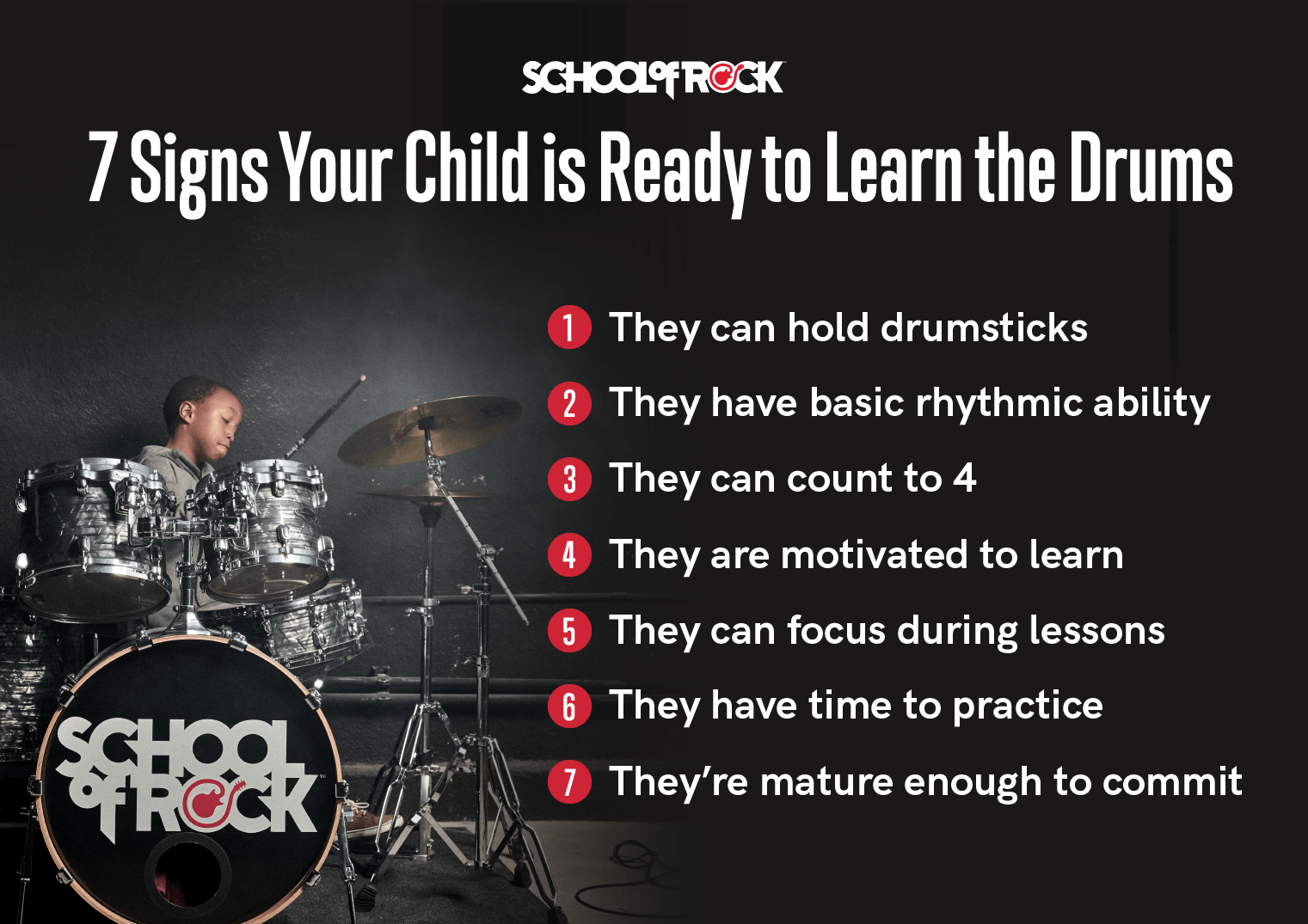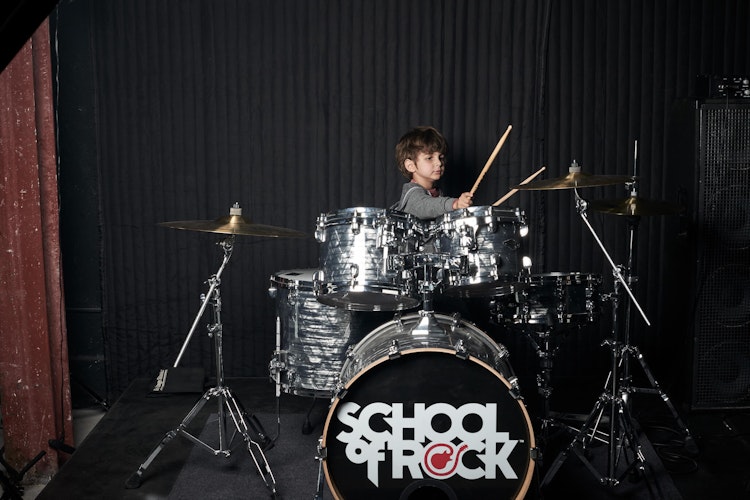Does your child constantly drum on household objects like tabletops or pots and pans? Do they like to make noise using whatever they have in their reach? Congratulations: you just might have a drummer in the family!
There is a drummer inside almost every one of us, just waiting for the chance to arise after only a few drum lessons. The drums are one of the most universal instruments found throughout the world and are used for a variety of purposes in many different cultures.
Still, many parents wonder: how do you know when a child is ready for drum lessons? Here at School of Rock, our instructors can help you decide the best age for begging drum lessons that are geared for both kids and even yourself.
WHAT IS THE BEST AGE TO LEARN DRUMS?
The best age to start drum lessons is generally between ages 6 to 7, as this is the age when most students gain the mental focus needed to learn an instrument. Even so, while ages 6 to 7 are considered the best age for begging drum lessons there are always exceptions, and it ultimately comes down to your child's willingness to learn.
The best age to start drum lessons is between the ages of 6 and 7, but there are always exceptions.
Is your child ready to start drum lessons?
For the beginning musician, the drums are one of the easiest instruments to pick up and are an ideal instrument for students of all ages. Still, all students are unique, and each progresses at their own pace. Before placing your child into classes and drum lessons for kids, it’s important to prepare your child for what they'll need to learn.
Concepts like rhythm or timing are important music skills when learning the drums, and younger children in particular can benefit from the positive effects of music on cognitive development. These effects will have a positive impact on growth and learning in other activities. This is especially true when beginning drum lessons are taught in a focused music program that combines group practice with one-on-one instruction.

7 SIGNS YOUR CHILD IS READY FOR DRUM LESSONS:
- Your child can comfortably hold the sticks. Children may get frustrated in beginning drum lessons if the sticks are too big for their hands. If the drumsticks are too big, consider hand percussion instead.
- Your child has a basic rhythmic ability. If you notice your child can keep rhythm as they dance or play along to songs, then they have the basic rhythmic ability needed to learn an instrument. Programs like the Little Wing music program are focused on teaching younger kids these skills and feature many different drum lessons.
- Your child can count to 4. When taking drum lessons, it’s important to understand drum notation – which uses timing and basic counting skills.
- Your child is motivated to learn. If your child expresses interest in wanting to play the drums, then they probably are ready to take the next step.
- Your child has the focus needed for lessons. Most drum lessons are between 30-45 minutes long. Children who cannot hold focus for this amount of time may not be ready to begin lessons.
- Your child has time in their daily routines to practice. Regular practice is essential for learning any instrument. Children with no time to practice drumming will not see results and become frustrated. Our experts recommend students practice their beginning drum lessons for at least 30 minutes every day.
- Your child is mature enough to commit. To start playing the drums, a student must be mature enough to take on the commitment of learning an instrument, respect their peers, and practice consistently.
Play the drums in real performances
Our music programs and drum lessons for kids are taught by practicing drummers with the experience you need to learn to play. Perform live shows and develop your drum skills in a supportive learning environment for all skill levels.
Learn to play
6 TIPS WHEN STARTING THE DRUMS
When learning the drums, there are some tips that will help make the journey successful.
- Look at drum size. To start, the drums should be set up to fit the student’s size.
- Get a properly-sized drum throne. The drum throne should be at a comfortable height and all drums should be in easy reach.
- Focus on the basics first. In beginning drum lessons, students should focus on getting the basics down as opposed to just playing fast.
- Use practice pads for quiet study. Practice pads, along with low-volume cymbals and drumheads, will help keep the sound levels manageable, especially around the house.
- Protect your ears. Hearing protection is important with drumming, and there are many different levels of hearing protection available depending on the needs of your child.
- Learn with other students. Playing with other new drummers is a great way to quickly improve on the instrument. School of Rock offers unique opportunities for young students to play together in a band as part of a fun learning environment.
Pro tip: Buying your kid's first drum set
If you’re looking for your kid's first drum set, check out our buying guide for tips on finding the best drums for a beginner, so you can get to playing as soon as possible.
Check out our "Guide to Buying Your First Drum Set"
Is it ever too late to start drums?
Absolutely not! While we recommend that drummers start studying at ages 6 to 7, kids shouldn’t have all the fun. It’s never too late to pick up the drums or nurture your inner rock star. In fact, the School of Rock Adult Program sees many adult students succeed in their drum lessons every day.





